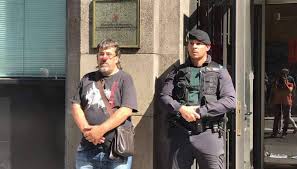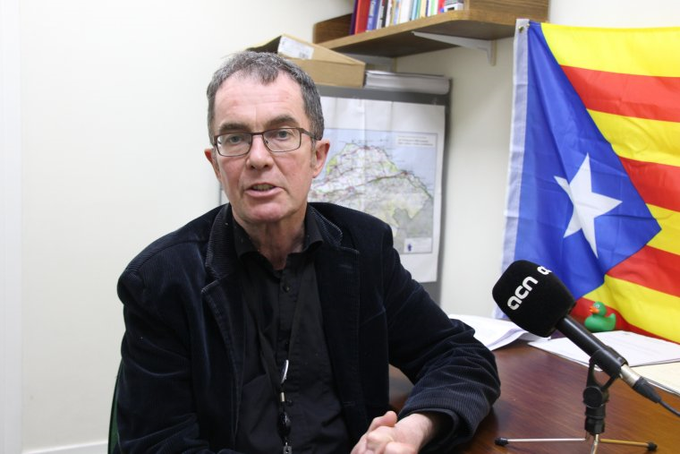While liberal democrats are so sincerely outraged by “illiberalism” in Hungary and Poland, fascism is alive and well in Spain. But then, Spain blindly obeys Germany, so that is okay.
Chris Bambery is author and broadcaster. Co-author (with George Kerevan) of Catalonia Reborn: How Catalonia Took on the Corrupt Spanish State and the Legacy of Franco (Luath Press, June 2018)

Two great Spanish EU liberal democrats: Rodolfo Martín Villa (centre) and Juan Antonio Samaranch (left)
In London, Paris or Berlin it is hard to understand how a court – indeed, the most senior court in the land – could remove a President for displaying ribbons and banners from a government building.
Back in the 1980’s Margaret Thatcher must have been irked to have to look across the Thames from the Houses of Parliament and see a banner on London’s former County Hall, displayed by the Labour Greater London Council (GLC), stating the number of unemployed in the city under her government. Thatcher would abolish the GLC, but the banner was not her primary reason for her decision, more the GLC was a political thorn in her side and had to go.
Yet we are talking about Spain where the Supreme Court and other judicial bodies have repeatedly interfered in the democratic affairs of the Catalan government and parliament to overturn democratically taken decisions.
The Supreme Court announced its verdict on Monday that Catalonia’s President, Quim Torra had, “repeatedly and stubbornly disobeyed the orders of the Central Electoral Board to remove certain symbols from public buildings belonging to the [Catalan government] during the electoral process.”
The Supreme Court confirmed the one and a half years sentence of disqualification against President Torra for refusing to immediately remove the banner hung from the Government offices in Barcelona, upholding the earlier conviction by the Superior Court of Justice of Catalonia (TSJC).
Torra is guilty of “disobedience.”
Spanish unionist parties were quick to applaud the Supreme Court’s action. The head of the neo-liberal Ciudadanos, Inés Arrimadas, stating:
“Public spaces are for everybody and a politician cannot break the law to flood us with separatist propaganda… Justice has been served.”
In response to President Torra’s defence that displaying banners in solidarity with the jailed independence leaders was a matter of defending fundamental rights, including freedom of speech, the People’s Party’s Alejandro Fernández dismissed this saying:
“It was not a neutral campaign for freedoms.”
The Deputy Secretary General of the ruling Spanish Social Democratic Party (PSOE), Eva Granados, said that Torra’s ousting was “the logical consequence that should happen under any rule of law,” adding, “What we have is the disqualification of a president who has disobeyed.”
Not to be outdone, the far-right Vox, who had brought a private prosecution against Torra and thus became part of the official prosecution team, bragged, “Torra disqualified, once more thanks to Vox and our legal team.”
This verdict and the chorus of approval from Spanish unionists can only deepen the growing divide between Catalonia and Spain.
Toni Strubell and Núria Bassa have already written about the impact of the case in Catalonia (here) where Torra’s removal has angered so many, including those outside the pro-independence camp, and awoken recent and older memories of Spanish actions to remove Catalan Presidents, including the execution in 1940 of Lluis Companys, who befroehand was arrested by the Gestapo in occupied Paris and handed over to General Franco.
What I want to look at is the politicisation of the Spanish judiciary
This is a judiciary which was quick to take action against Torra and which awarded jail sentences totalling over 100 years to nine Catalan civic and political leaders charged with organising the 1 October 2017 independence referendum. Declared illegal by the Constitutional Court who then authorised Spain’s security forces to stop the referendum vote.
Will it be so quick to take action against the People’s Party (PP), in government at the time of that referendum, after El Pais this week revealed that while in office covert operations were carried out by a group of high-ranking members of the National Police working for the Interior Ministry under the PP administration, without judicial authorization or oversight? These included illegally spying on former Popular Party treasurer Luis Bárcenas and disseminating false evidence against Catalan pro-independence politicians and the leftwing party Podemos.
Might it take action to stop the Spanish government continuing to pay bonuses to 115 police officers who were awarded medals by the dictator General Franco, including one officer accused of multiple acts of torture?
Will Spain’s Supreme Court judges support the prosecution by the Argentinian judge María Servini, who sits on the bench of the First Federal Court of Buenos Aires and who is handling the case against a number of former Spanish government officials who are facing charges of crimes against humanity committed during Franco’s regime. Earlier this month Justice Servini summoned former Franco minister Rodolfo Martín Villa to a court hearing that will be conducted online from the Argentinian embassy in Spain. Villa is accused of authorising a police attack in 1976 on a strike rally in a church in the Basque city of Vitoria. On 3 March 1976 Spanish police fired hundreds of rounds at workers who were gathered in a mass meeting at the local San Francisco church, killing five. Villa was a minister under Franco and in the government which ruled immediately after the dictator’s death and which maintained much of the repressive response to the anti-fascist opposition. Ceaqua (Coordinadora Estatal de Apoyo a la Querella Argentina, CeAQUA , founded in 2013 to support prosecutions in Argentina for crimes committed by the Franco government in Spain) has pointed out that Martín Villa led “a repression machine that nobody has answered for yet” and that “his actions led to an all-out, systematic attack against civilians”.
Those same Spanish unionists who applauded the ban on Torra rushed to Villa’s defence. Four former prime ministers, Felipe González PSOE), José María Aznar (PP), José Luis Rodríguez Zapatero (PSOE) and Mariano Rajoy (PP) wrote to the Argentinian judge in defence of Villa. They were, incredibly, joined by four former leaders of Spain’s biggest trade union federations, the CCOO and UGT. Those who died in Vitoria were CCOO members!
Josep Borrell, the current High Representative of the European Union for Foreign Affairs and Security Policy, has also written “privately” to the judge in the same vein.
Incidentally, to answer my own question the Spanish courts ruled against prosecuting Villa.
How is the Spanish Supreme Court doing in returning King Juan Carlos to Spain after he fled to the United Arab Emirates earlier this year? Juan Carlos is accused of using a Swiss bank account to squirrel away anywhere from $78 million to $100 million he received from Saudi King Abdullah bin Abdulaziz in 2008, three years before a Spanish consortium made the winning bid for a $5.5 billion high-speed rail project in Saudi Arabia.
In 2014 he had to hand over his throne to his son, Felipe, after Juan Carlos’s son in law was jailed for corruption.
Spanish Socialist Premier, Pedro Sánchez, whose party is formally republican, has striven mightily to defend a rocky looking monarchy, arguing that Spain needs “stability and robust institutions.” In his autobiography, the prime minister said regarding Felipe that they “connected in a special way, trusted each other and established a very frank relationship” at the time of the October 2017 Catalan referendum. Sánchez supported sending in the security forces who smashed their way into polling stations to seize ballot boxes attacking those waiting to vote, and Felipe broadcast denouncing pro-independence Catalans.
Spain’s judges include a major number of political appointees, mainly made by the PSOE and PP as they rotate in office. Judges are appointed by a board selected by the Spanish parliament. These judges have the taste for overturning the decisions of elected politicians in Spain autonomous regions and nations, particularly but not only in Catalonia – for instance after the Catalan Parliament voted to ban bull fighting.
This is well known in Brussels but for some reason the European Commission draws a veil over the matter. The reason why is not hard to fathom. Spain is too big and important within the EU too upset. While EU leaders, rightly, denounce repression in Belarus they stay mum over what is happening in Catalonia.
Meanwhile, remember our old friend, the clown Jordi Pesarrodona, who was threatened with legal action after being pictured wearing a red nose alongside a member of the paramilitary Spanish police force, the Guardia Civil, while they were raiding a building during the operation attempting to stop the 1 October referendum.

Well on the same day as President Torra was removed from office, so was our friend the clown – he is a councillor in his hometown of Sant Joan de Vilatorrada, in central Catalonia. His crime? Organising voting in the referendum in a local school. Jordi was banned from public office for 14 months for “disobedience” during the referendum and ordered to pay a fine of €2,100 plus legal costs.
During the trial on September 21, Pesarrodona told the judge that he did not participate in the organisation of the vote but was there as an ordinary citizen.
The sentence is lower than that requested by the Public Prosecutor’s Office, which asked for a two-year disqualification on holding public office.
Spanish democracy is a mighty thing to behold.
Chris Bambery



Be the first to comment